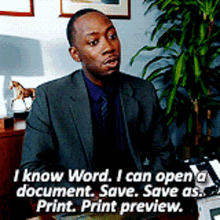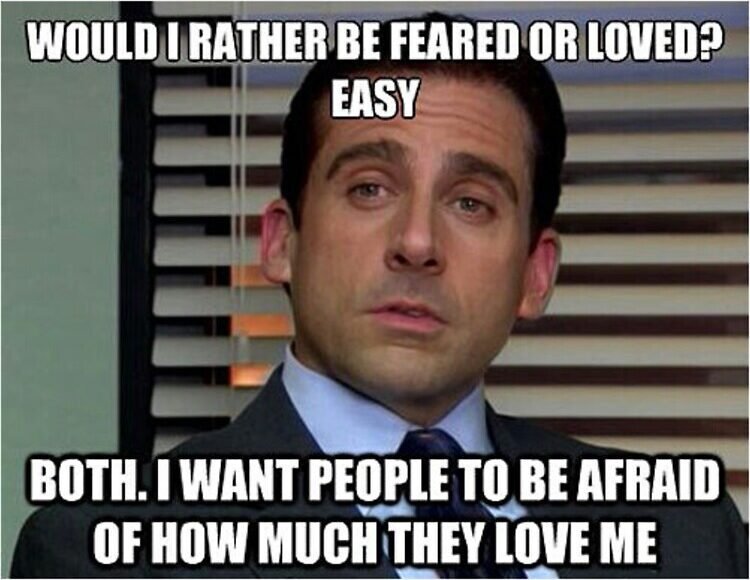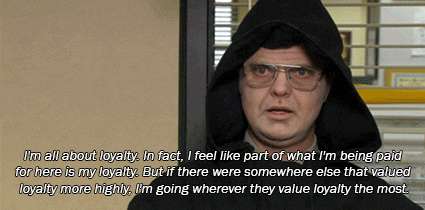Reading Time: 8 mins
Why Do Some Interviews Feel Like Mind Games?
Good news? You landed an interview. Bad news? Candidates with telepathic powers will be given preference.

This is Part 3 of a six-part series on job-hunting where I discuss:
😩 Why it’s hard to find a job right now
🤝🏼 Networking in 2024
🎲 Interviews vs. mind games
🦄 The myth of the ideal candidate
💔 Rejection emails
🧠 Mental health tips
In my first post I mentioned how landing a job has a lot to do with being at the right place at the right time AND the ability to persuade someone that you’re “the one”.
The first is pure luck. You meet someone at a conference who’s hiring. Your college friend is buddies with the hiring manager. You enrolled in a course and now you’re workshopping with a recruiter. The stars aligned. You get the idea.
But this is just half the battle.
“So tell us about yourself.”

The second (i.e., your ability to your ability to persuade or convince your audience) is influenced so heavily by a combination of incalculable factors, such as your childhood, the recruiter’s racial and cultural bias, how hungry the hiring manger is during the call, you well you slept the night before, the time of the interview, your physiological state during the interaction, their physiological state during the interaction, etc., that it’s actually hard to pin down the one thing that’ll knock their socks off.
(On a totally unrelated note, I once had a hiring manager actually take his sock off during the interview as a joke, but that’s a story for another time). 🧦
If you think I’m exaggerating, consider this famous study showing that judges tend to give out harsher sentences before lunch than after lunch. We all like to think we’re excellent decision-makers until we’re fighting hunger pangs for a turkey sub at noon. ¯\_(ツ)_/¯
To make matters worse, it’s not uncommon for employers to say they want X when they actually want Y. I know this because I’ve been on both sides of the interview panel—and from what I’ve seen, many hiring managers haven’t a clue what they’re looking for.
They often assume they’ll know it when they see it.
It’s our delusional version of “real recognizes real” made worse by corporate platitudes that implore you to “bring your whole authentic self to work”.
But the irony is that job interviews are the antithesis of “keepin’ it real”. For candidates, they’re about reading the room and saying things that will most likely resonate with the hiring team. Except, most of the time, you have no idea who the heck they are so you’re shooting in the dark.
Why else are we advised to look up the hiring team and make educated guesses about their preferences? There’s no room for you to be authentically you—it’s the version of you that’ll satisfy their expectations. Commonly known as impression management.
Let the games begin
To add to this performative pressure, we’re often told there are “no right or wrong answers”. But there are. There are definitely things you shouldn’t say. Sorry to burst your bubble, but no one gets hired because of creative differences with their future boss!
Of course, there are always exceptions. Your ideal might be different from my ideal. But there is a general preference when it comes to expanding a team.
Typically, at entry and mid-senior levels, the “ideal candidate” is someone who seems capable enough to do the assigned tasks and passive enough not to challenge the status quo. Most hiring managers simply want a safe bet—and for good reason.
But then you have interviews that are so unnecessarily intense and intrusive that it feels like a psychological experiment designed by Corporate Jigsaw™.

“How would you deal with a bad coworker? For us, that’s George and he’s sitting in on this call. You have 30 seconds. Your time starts now.” 👹
The more compliant your responses, the “safer” the bet.
And if you’re the type of hiring manager that likes to ask for “definitions” in an interview, maybe it’s time to rethink your strategy. Is it more important that the person remembers acronyms, or knows how to use specific tools in the context of your team and organizational goals?
❌ Instead of: “Define CMS for me.”
✅ Ask: “Are you familiar with this content management system? What was your favorite and least favorite thing about it?”
Why?
Hiring managers who make the candidate feel comfortable (instead of intimidating them) are able to encourage honesty without invoking the threat of disqualification. This is critical for a smooth interview process because it allows candidates to relax and be more natural, while revealing your emotional intelligence as a prospective boss.
Then there’s outdated behavioral questions that elicit such contrived responses, you can’t help being a smartass and risk disqualifying yourself as a candidate.
“Where do you see yourself in 10 years?”

I get it, you want to hire someone with ambition and drive. Well, how about being less cryptic and saying what’s really on your mind? If you’re concerned that interviewees will lie through their teeth, what makes you think they won’t lie more easily to questions they’ve been asked a million times before?
Your job isn’t to spot a liar. It’s to gather evidence of competence and compatibility.
Want to make sure the candidate is collaborative? Ask them how they feel about working with 5 people on a project. Want to know if they care about professional growth? Ask them if they're interested in any courses, conferences, or workshops. Want to know if they stay on the pulse of things? Ask them if they've noticed any industry trends in the last 6 months.
It’s not rocket science. And it’s not set in stone. It’s just reciprocity and thoughtfulness, which forms the bedrock of all good conversations.
But don’t just take my word for it. Entrepreneur and co-founder of Maven, Wes Kao (who writes a terrific newsletter on all things professional management), talks about the importance of ignoring interview rules—and even creating new ones. Here’s how she puts it:
“It’s not about saying “Gotcha!” and trying to stump the candidate. This is about inviting the candidate to share how their brain works and exploring ideas together. It’s meant to bring out the best in candidates. You want to see where the candidate naturally goes, i.e. what excites them and what they spend more time talking about. When in doubt, we go to topics we know well. What they talk about is likely to be what they’ll suggest when they start the job.”
Wes Kao, co-founder Maven
Corporate performativity
Unpopular opinion: unless you’re working in a profession that requires some kind of mental jiu-jitsu (like criminal defense or hostage negotiation), there’s no reason to present overly complex hypothetical scenarios or philosophical dilemmas that just invite more cringe to the conversation.

Don’t get me wrong. I think interviews are important—but this is exactly why they’re not the two-way street many make it out to be. Especially for applicants that are unemployed and looking for their next paycheck as opposed to applicants who are looking to switch jobs and can therefore afford to be picky.
Sometimes people don't fail interviews. Interviews fail people.
Remember: it’s not an interrogation—it’s a conversation. The right questions are as important as the right answers. You’re trying to get to know someone, so… get to know them! It’s in your best interests to meet the real person behind the “test” because that’s who you’ll be working with 35 to 40 hours a week. Not a corporate robot programmed to give perfectly tailored HR responses.
No matter how many reassurances you give the candidate, strictly hypothetical questions will generate strictly hypothetical responses. Keep at it and candidates will just say what they think you want them to say. Because every recruiter on the block is telling them to drink the Kool-Aid—or, at the very least, pretend to chug it down in the name of company cult… I mean culture.

The art of asking questions
You might think candidates are always encouraged to ask questions, but if we probe half as much as the hiring manager does, we run the risk of sounding “difficult” and snoopy. (Some feathers are better left unruffled—especially if they’re going to be signing your next paycheck!)
It’s important to gauge how a candidate handles stress. But probing for “no-right-or-wrong” answers (that are definitely right or wrong in your mind) pushes the candidate to wear a mask that will inevitably come off once that contract is signed.
And you may not like the face behind it. 👹
The way I see it, there’s a missed opportunity here. Curiosity is an incredibly undervalued sign of intelligence, which can unlock new insights for both parties involved.
Asking good questions is a lost art. And good questions aren’t necessarily behavioral or situational or even technical—they simply stem from a genuine desire to learn. Through questions, people often reveal how they process information and what they really value, which tends to generate productive conversations.
In my experience talking to smart people, this is what separates a dud interview from a great one—both parties are genuinely curious about getting to know the other to achieve a common goal. It’s not one-sided because productive conversations never are.
The beauty of this approach is that candidates can use it to relax, be themselves, and learn more about the role and what it actually entails, while hiring managers can use it to observe how a candidate thinks. Listen carefully to the specific aspects of the job they’re curious about and encourage them to ask questions throughout the process—not just 5 minutes at the end.

If you’re wondering how to construct good questions as a hiring manager, check out Wes Kao’s list of favorite interview questions and observe her rationale for each one. The questions are intended for marketers, but the rationale is solid enough to work in any context. These questions (and the thinking behind them) are so good, in fact, that when I first read them I actually got excited about the prospect of answering them. Me, a textbook introvert.
Believe me, candidates with half a brain will appreciate a smart interviewer who creates psychological safety. But you don’t get there by simply saying there are no wrong answers. You get there by actually showing it in your line of questioning.
You don’t want to hire a know-it-all, so stop forcing candidates to act like one.
Invite curiosity. See what happens. 🧠💡✨
Stay tuned for my NEXT post from this six-part series on job-hunting where I’ll discuss the myth of the “ideal candidate”—and mental health tips to get through your job search!
Have some thoughts? Drop a comment below—and get notified when my next post is up!
